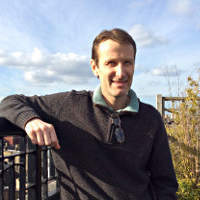Many of us I know have become increasingly engaged in environmental issues and climate change in recent years and in the church’s unique role in responding to these challenges. In exploring these areas I have found myself coming into contact with people of faith who are part of the Extinction Rebellion movement. Now I have frequently heard people comment that the tactics of Extinction Rebellion and other environmental groups are counterproductive but I’m also aware at the same time how they have also managed to change public debate. I too have experienced the delayed journeys and I work for a council that has significant demands placed on it in responding to protests. I have been challenged though, and indeed blessed, in meeting Christians who are active in this area.
One is a member of a church in Lewes who instigated the coat of hopes. She walked from Newhaven to Glasgow last year, I joined her, just on the first day, and the coat was decorated with patches made by supporters and hosts along the way. Perhaps you might have seen pictures of it arriving at CoP26, it attracted quite a lot of media attention at the time.
During Holy Week this year, I spent time at Hilfield Friary, a Franciscan community in Dorset and whilst there I met a member of Christian climate action who had just taken part in blocking an oil facility.
I noticed in meeting these people a strong sense of their being rooted in prayer and contemplation and a palpable sense of what has been termed environmental grief. I’ve also become familiar with what is referred to amongst Christian activists as the sacrament of civil disobedience which is an idea that seeks to describe the profound sense of Christ’s presence in the sacrifices that civil disobedience demands.
Now I’m not an environmental activist, I’m not telling you that the tactics of protest and civil disobedience are correct but I am wanting to openly share with you the challenge that I have experienced having engaged with Christian activists in this area and finding them to be encounters with people of clear spiritual maturity. It has prompted me to ask what the appropriate response of people and communities of faith might be in the face of these challenges, particularly when it increasingly clear that whilst companies and Governments sign up to aspirational agreements to limit climate change they are simultaneously agreeing plans for extraction of fossil fuels into the future that, if they proceed, will assure those aspirations are not met and that the world will face runaway climate change and its impacts.
This certainly seems to me to be area where it is essential that contemplation directs action. In the life of faith we can often experience a tension between contemplation and action. The secular world of course care only for action and outcomes, that’s certainly the case in my public health work and indeed the church very easily defaults to the same mentality particularly in the face of institutional decline. When presented with issues like the environmental crisis and climate change though we can see a sort of paralysis. When the immediately available technological solutions are inadequate more fundamental questions about the lives we lead, the society that we create and the role of Governments are deferred.
The story of Mary and Martha that we heard this morning is one that, it seems to me, has become increasingly counter cultural over time emphasising as it does the primacy of contemplation. Martha complains that she alone is taking care of chores whilst Mary sits listening at Christ’s feet. We might expect some apology from Jesus and Mary and their help so that everyone can settle down together but no. Jesus says – ‘Martha, Martha, you are worried and distracted by many things; there is need of only one thing. Mary has chosen the better part, which will not be taken away from her.’ We can well imagine how Martha, and we ourselves, might have responded can’t we? It’s alright for some. These floors won’t wash themselves etc.
What I observe in myself and also in our society is the distraction that Jesus refers to. Martha is not here engaged in action that is the product of contemplation, rather she is busy when she need not be.
The crucial lesson for us here then I think is that action should be rooted in contemplation because without it we have no discernment, no receptivity to God’s call and instead create and energetically pursue our own designs which although well-meaning can so easily become distorted or despite knowledge that our ways of life are unsustainable we chose distraction because we are unable to conceive of an alternative.
I’ll close with a prayer – O God, heavenly Father, your Son Jesus Christ enjoyed rest and refreshment in the home of Mary and Martha of Bethany: Give us the will to love you, open our hearts to hear you, and strengthen our hands to serve you in others for his sake; who lives and reigns with you and the Holy Spirit, one God, now and for ever.
Amen.



